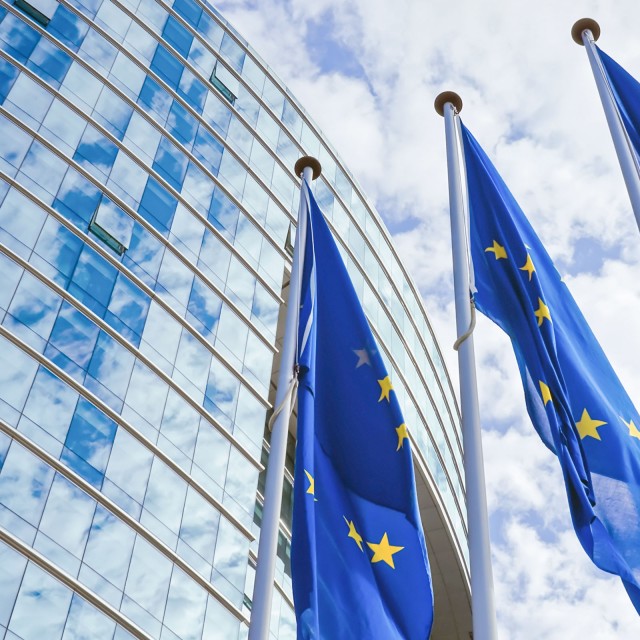This week, I had the opportunity to attend the traditional Capital Market and Investment Conference (KapInKon) hosted by LBBW in Frankfurt. We followed fascinating discussions about geopolitics and the US elections, featuring high-profile guests like former German Vice Chancellor Sigmar Gabriel and Colonel Dr. Markus Reisner, a renowned Austrian military historian.
Can the energy transition succeed?
Under this title, I discussed with Arina Freitag, CFO of the Dutch-German grid operator TenneT, the prospects for Germany's energy transformation. And I learned along the way: Nearly twothirds of the audience see the energy transition as an opportunity for Germany rather than primarily a risk.
For this assessment and the accompanying hopes to be fulfilled, considerable efforts are still needed. For too long, Germany has indulged in the pleasant illusion of a "green economic miracle," where it would effortlessly glide into a new, golden (or rather: green) era. We know today that this was naive from the start.The transformation is capital-intensive and requires substantial investments in infrastructure, not least in more powerful grids and storage systems that make renewable energy available when and where it is needed. The benefit of lower energy costs follows only thereafter.
The bill, please!
Germany's energy strategy envisions that by 2030, 80% of electricity should come from renewable sources. Currently, the country is at about 57%. Considering that electricity consumption will rise rapidly due to the spread of electric vehicles, heat pumps, and similar technologies, the capacity of renewable power generation would need to double by 2030. The goals were established in 2021 because Germany's Federal Constitutional Court ruled that the Basic Law demands climate neutrality to protect the rights of future generations. Germany is also a signatory to the Paris Agreement. Transformation is without alternative.
But the overhaul of the energy sector does not come for free. To achieve the energy transition goals, investments of 721 billion euros are needed by 2030, according to a study by the German Association of Energy and Water Industries (BDEW) and EY. About half of this amount is allocated to the expansion of generation capacities. The required sum corresponds to annually 2.5% to 3% of Germany's GDP by 2030.
Who will pay for it?
The investment is substantial but manageable, especially since billion-euro expenditures for fossil fuels will gradually disappear, and significant costs would also arise from maintaining the current course. The bulk of the expenditures will fall on private investors. They primarily need planning security and streamlined approval processes. There is still room for improvement here!
However, the public sector will also have to bear part of the investments. The question arises whether Germany should burden these costs on the current generation, which is largely responsible for climate change. That would mean strengthening state revenues, in plain terms, raising taxes. Alternatively, the burden could be placed on future generations, who will one day enjoy the benefits of affordable green energy. This would require loosening the strict limits on government’s debt break. A neithernor approach is dishonest. Personally, I agree with the KapInKon audience: if Germany pushes ahead with the energy transformation, it will strengthen its economy. But not overnight. The gods of transformation have placed sweat before success!
This publication is addressed exclusively at recipients in the EU, Switzerland, Liechtenstein and the United Kingdom. This report is not being distributed by LBBW to any person in the United States and LBBW does not intend to solicit any person in the United States. LBBW is under the supervision of the European Central Bank (ECB), Sonnemannstraße 22, 60314 Frankfurt/Main (Ger many) and the German Federal Financial Supervisory Authority (BaFin), Graurheindorfer Str. 108, 53117 Bonn (Ger many) / Marie-Curie-Str. 24-28, 60439 Frankfurt/Main (Germany). This publication is based on generally available sources which we are not able to verify but which we believe to be reliable. Nevertheless, we assume no liability for the accuracy and completeness of this publication. It conveys our non-binding opinion of the market and the products at the time of the editorial deadline, irrespective of any own holdings in these products. This publication does not replace individual advice. It serves only for informational purposes and should not be seen as an offer or request for a purchase or sale. For additional, more timely in-formation on concrete investment options and for individual investment advice, please contact your investment advisor. We retain the right to change the opinions expressed herein at any time and without prior notice. Moreover, we retain the right not to update this information or to stop such updates entirely without prior notice. Past performance, simulations and forecasts shown or described in this publication do not constitute a reliable indicator of future performance. The acceptance of provided research services by a securities services company can qualify as a benefit in supervisory law terms. In these cases LBBW assumes that the benefit is intended to improve the quality of the relevant service for the customer of the benefit recipient. Additional Disclaimer for recipients in the United Kingdom: Authorised and regulated by the European Central Bank (ECB), Sonnemannstraße 22, 60314 Frankfurt/Main (Germany) and the German Federal Financial Supervisory Authority (BaFin), Graurheindorfer Str. 108, 53117 Bonn (Germany) / Marie-Curie-Str. 24-28, 60439 Frankfurt/Main (Germany). Deemed authorised by the Prudential Regulation Authority. Subject to regulation by the Financial Conduct Authority and limited regulation by the Prudential Regulation Authority. Details of the Temporary Permissions Regime, which allows EEA-based firms to operate in the UK for a limited period while seeking full authorisation, are available on the Financial Conduct Authority’s website.



